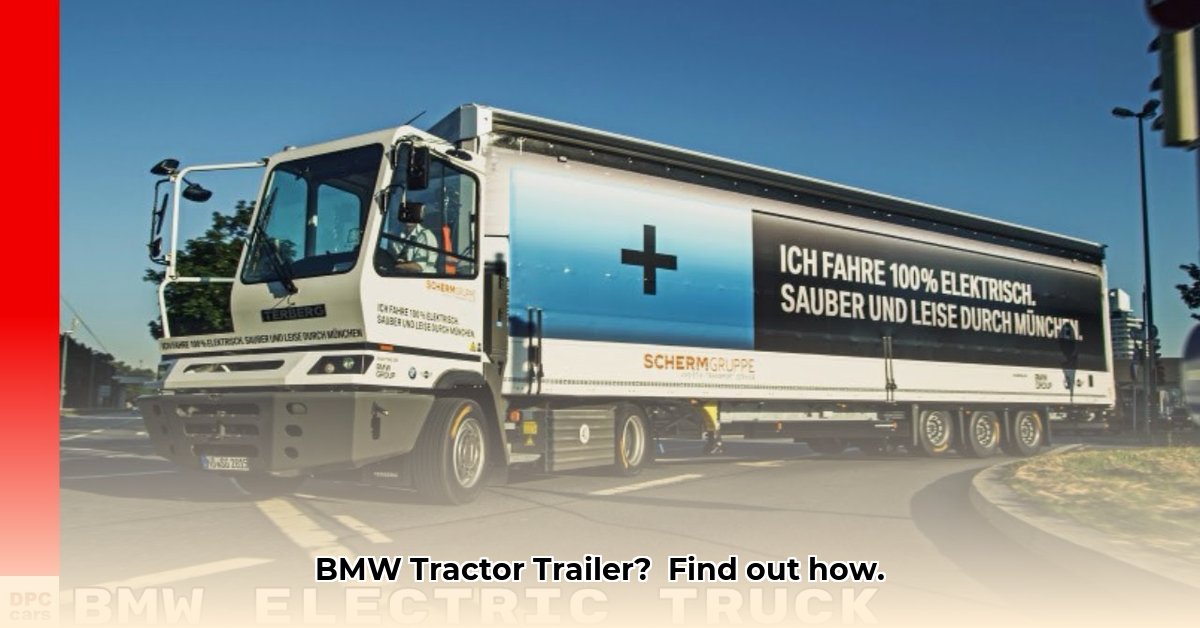
Imagine a future where the rumble of diesel engines is replaced by the silent hum of electric motors, even on the largest haulage routes. This future is rapidly approaching, and BMW, a name synonymous with automotive innovation, is at the forefront, spearheading a revolution in logistics with its innovative electric tractor trailer. This isn't just about environmental responsibility; it's about a smart, financially viable shift in the trucking industry. For more on the cost implications, see tractor trailer costs.
Electrifying the Road Ahead: BMW's Bold Gamble
The trucking industry faces a pivotal moment. Diesel is on its way out, driven by increasing environmental concerns and stricter emissions regulations. Electric vehicles are poised to take center stage, but fully electric semi-trucks present their own challenges; high purchase prices, limited range, and the scarcity of adequate charging infrastructure. BMW's strategy elegantly sidesteps these roadblocks. By focusing on electrifying the trailer itself, not just the tractor unit, they've devised a solution that dramatically boosts the feasibility and practicality of electric trucking. This innovative approach could redefine the economic viability of electric haulage.
The Tech Behind BMW's Electric Trailer
BMW's innovation lies in electrifying the trailer axles. This design significantly reduces energy consumption during transport, boasting a remarkable 46-48% reduction in diesel fuel use compared to traditional setups, as indicated by internal testing. When paired with an electric tractor unit, the combined range extends beyond 600 kilometers—sufficient for many long-haul routes. This leap in efficiency and range dramatically enhances the appeal and practical application of electric trucking, overcoming limitations that have previously hampered widespread adoption. Isn't this a game-changer for sustainable freight transportation?
The Finances of Going Green: Is it Really Worth It?
While the initial investment in a BMW electric trailer is higher than its diesel counterpart, the long-term financial advantages are compelling. Reduced fuel consumption directly translates to lower operating costs. Furthermore, simpler maintenance requirements lead to less downtime, preserving operational efficiency. The overall total cost of ownership (TCO) presents a strong case for the electric trailer. Early data suggests that TCO parity with diesel vehicles is achievable within a reasonable timeframe, particularly on specific routes and for particular operational models. The return on investment (ROI) will vary significantly––dependent on mileage, load type, and specific operational conditions––but the potential for substantial financial returns is undeniable.
Obstacles on the Road to Electric Trucking
Despite its promise, several hurdles remain. The increased weight added by the electric trailer's batteries could lead to reduced payload capacity, a significant concern for freight companies. The insufficient availability of high-powered charging stations capable of handling the energy demands of heavy-duty electric vehicles presents another considerable challenge. Government regulations also play a critical role. However, the increasing likelihood of government incentives designed to promote the adoption of electric vehicles, coupled with tighter emissions standards globally, are likely to accelerate the shift towards electric trucking.
A Peek into the Future of Long-Haul Trucking
The electrification of the trucking industry is not a question of if, but when and how quickly. BMW's electric trailer represents a pivotal advancement, offering a practical and financially viable pathway towards a cleaner and more efficient logistics ecosystem. This technology could be the linchpin unlocking the full potential of electric trucking, transforming the industry's environmental impact and economic landscape.
Weighing the Pros and Cons of BMW's Electric Trailer
This comparative table highlights the key advantages and disadvantages of BMW's electric trailer:
| Pros | Cons |
|---|---|
| Significantly extended range, even with diesel tractors | Higher initial investment cost |
| Reduced fuel consumption and greenhouse gas emissions | Increased weight, potentially impacting payload |
| Lower long-term maintenance costs | Dependence on development of robust charging infrastructure |
| Improved overall efficiency | Regulatory uncertainty and evolving standards |
What's Next for the Industry? Actionable Steps for Everyone Involved
The transition to electric trucking requires a collaborative effort. Here are actionable steps for key stakeholders:
Original Equipment Manufacturers (OEMs):
- Invest in next-generation battery technology and efficient charging infrastructure.
- Collaborate to establish universal charging standards, reducing costs and simplifying the transition.
Fleet Operators:
- Thoroughly analyze the TCO and ROI of electric trailers for their specific operational models.
- Pilot electric trailers on routes optimized for their current capabilities to gather real-world data.
Governments:
- Introduce policies and incentives to encourage the adoption of electric trucks and trailers.
- Invest in developing a robust and convenient public charging network for heavy-duty vehicles.
BMW's electric trailer is more than just a technological advancement; it represents a paradigm shift towards a more sustainable and efficient logistics sector. Its innovative approach addresses the challenges inherent in electric trucking, offering a compelling vision for the future. The journey towards widespread electric trucking is ongoing, but BMW's innovative technology is accelerating our progress towards a greener, cleaner transportation system.